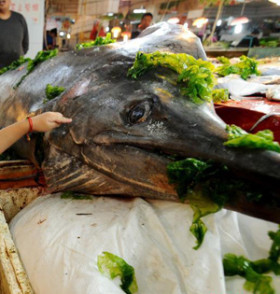Our reporter Fu Mengmeng reports from Beijing
On January 21, under an office building near Fuxingmen in Beijing, the roadside was filled with electric tricycles with the names of various express companies. In front of these electric tricycles, a large number of packages were stacked. The courier, Xiao Li, is busy among them.
"There are many companies in this office building, and the number of deliveries and receipts is very large every day." Xiao Li told the Huaxia Times that because the office building regulations do not allow couriers to deliver goods upstairs, as time passed, various express companies will "occupy" this space.
In 2014, the express industry became a "dark horse" driving China's economy. Statistics show that in 2014, China's express business volume reached 14 billion pieces, up 52% year on year, ranking first in the world. The "power behind" its blowout development is the rise of e-commerce.
Ma Junsheng, Director of the State Postal Administration, said that against the backdrop of the decline in the volume of traditional postal correspondence in various countries, the rise of global e-commerce, the popularity of online shopping, and the adaptation of postal services in various countries to changes in market and consumption, it is crucial to accelerate the transformation.
More than 50% growth
Xiao Li, 23, has been working as a courier for more than a year. In his opinion, the industry of express delivery has a bright future, because "old ladies have learned to shop online".
In the current public opinion, the monthly salary of more than 10000 yuan has become a synonym for express delivery. But when the reporter asked about Xiao Li's income, he waved his hand and said: "How could it be possible? I dare not think that the monthly salary is more than ten thousand. The express delivery staff in Jiangsu and Zhejiang are likely to get so much." Xiao Li said that due to the concentration of receipts in the region he is responsible for, his income is higher than that of other colleagues, and he only gets about 6000 yuan every month.
I will arrive at the company at 7:00 in the morning. It is midnight when I get home in the evening. I am fully armed with masks and earmuffs. I drive an electric tricycle through the streets of Beijing. This is the daily life of Beijing's couriers like Xiao Li. But they may not know that the packages they send out are of great significance for China's economy to stimulate domestic demand.
In 2014, China's express delivery business volume reached 14 billion, up 52% year on year, ranking first in the world. At most, there are more than 100 million express mails on the way. Behind this data is the rapid development of e-commerce industry. Recently, the Ministry of Commerce announced that the e-commerce transaction volume in 2014 reached 13 trillion yuan. This means that the average e-commerce consumption per person has reached 10000 yuan.
What Xiaoli did not know was that their work broke the original geographical limitations and became a bridge between rural and urban areas. In January last year, the National Post Office proposed "Express to the Countryside", which unleashed Guangfa's huge consumption power in rural areas, but also led to more productivity. In many rural areas, special agricultural products have also entered thousands of households in cities through the hands of couriers.
The rapid development of Internet technology and e-commerce is changing the rural production, consumption and circulation mode step by step. Statistics show that in 2014, more than 2 billion express shipments were sent to rural areas, driving about 200 billion yuan of materials to "go to the countryside", and driving agricultural products into cities through "reverse logistics".
Mr. Xu, who lives in Miyun County, Beijing, told our reporter that there is a large fruit forest behind his home. In his fruit forest, there are not only nearly 100 native chickens, but also a large number of green vegetables. Thanks to the spread of express network to the countryside, he sold his fruits, vegetables, farmed chickens and eggs on the Internet. In just half a year, 12000 orders were sold.
"The 'dark horse' of express delivery is endogenous in the market, which is expedited and nurtured by the reform. It is the reform that has tapped the market potential, unleashed the market demand, and promoted the development of the industry." Ma Junsheng gave such an answer to why the express delivery industry can achieve such great achievements in a short time.
Behind prosperity
There are also many helplessness behind the prosperity. With nearly a month to go before the Spring Festival of the Year of the Goat, the express delivery industry has entered the "New Year state" in advance. Every Spring Festival means a large-scale "labor shortage" for the express industry, and this year's "labor shortage" seems to come earlier than previous years.
The reporter recently interviewed a number of express outlets and learned that many express companies have been faced with the resignation of couriers. In an express online shop in Fengtai District, the staff told reporters that they had recently resigned three more express workers.
The person in charge of a express delivery network in Daxing District revealed to reporters that every year, some outlets delayed delivery because they could not recruit people, so they were fined tens of thousands or hundreds of thousands. "The more backlog, the longer time, the more fines," he said.
Xu Yong, chief consultant of Express Logistics Consulting Network, said that at present, the annual average turnover rate of private express personnel in China has reached 30%. However, compared with the "labor shortage", there is a more troublesome problem that causes express enterprises to hover on the edge of survival.
"Among the 20 well-known express brands or express brands with certain popularity in China, nearly half of the express enterprise headquarters have not yet made a profit." Xu Yong pointed out that e-commerce continues to use its own advantages of supply to suppress the price of express delivery, and its business model has changed from earning the price difference of goods to earning the price difference of express fees.
"Before 2005, the profit margin of express delivery enterprises was about 35%, but now the profit margin of most express delivery enterprises has dropped to below 5%, and a large number of enterprises are wandering on the profit and loss line. Now the express delivery industry is in the stage of full competition," said Zhu Xiang, a consultant of Bolong.
"The era of one or two yuan of profit for one ticket has long passed, and now only a few cents of profit for one ticket." Wang Zeyi, vice president of Yuantong Express Central China Management Area, also has many concerns. He said that due to years of disorderly competition in the industry, there has been a price war, especially the outbreak of e-commerce business. Although the business volume of express enterprises is increasing year by year, the same labor, warehousing The cost of vehicles is also increasing, resulting in less and less profit.
Many enterprises are trying to change the plight of low profits. Last year, some express regional franchisees placed advertisements on express mail and earned a certain amount of advertising fees.
In addition, some large express companies have entered the overseas shopping market with higher profits. In 2013, Shunfeng, the leading private express company, first tried overseas shopping business and launched overseas shopping and Fengyun. By 2014, companies such as Shentong and Yunda had begun to set foot in overseas business, or set up platforms or directly set up overseas companies.






